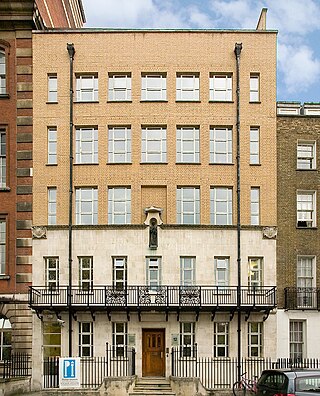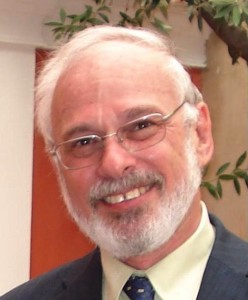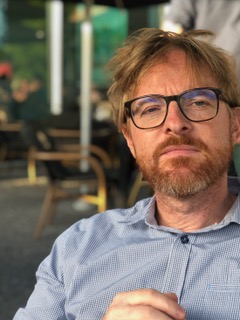
Transcranial magnetic stimulation (TMS) is a noninvasive form of brain stimulation in which a changing magnetic field is used to induce an electric current at a specific area of the brain through electromagnetic induction. An electric pulse generator, or stimulator, is connected to a magnetic coil connected to the scalp. The stimulator generates a changing electric current within the coil which creates a varying magnetic field, inducing a current within a region in the brain itself.
Neurotechnology encompasses any method or electronic device which interfaces with the nervous system to monitor or modulate neural activity.
Helen S. Mayberg was born in 1956 in California. She is an American neurologist. Mayberg is known in particular for her work delineating abnormal brain function in patients with major depression using functional neuroimaging. This work led to the first pilot study of deep brain stimulation (DBS), a reversible method of selective modulation of a specific brain circuit, for patients with treatment-resistant depression. As of August 2019, she has published 211 original peer-reviewed articles, 31 books and book chapters, and acted as principal investigator on 24 research grants. Mayberg is coinventor with Andres Lozano of “Method for Treating Depression Mood Disorders and Anxiety Disorders using Neuromodulation,” US patent 2005/0033379A1. St. Jude Medical Neuromodulation licensed her intellectual property to develop Subcallosal Cingulate Deep Brain Stimulation for Treatment-Resistant Unipolar and Bipolar Depression for the treatment of severe depression. As of 2018, Mayberg holds positions as Professor of Neurology and Neurosurgery and Professor, Psychiatry and Neuroscience, both at Mount Sinai Medical School, and Professor of Psychiatry, Emory University; Emory University Hospital. Since 2018, she has served as Director, Nash Family Center for Advanced Circuit Therapeutics at the Icahn School of Medicine at Mount Sinai.

Transcranial direct current stimulation (tDCS) is a form of neuromodulation that uses constant, low direct current delivered via electrodes on the head. It was originally developed to help patients with brain injuries or neuropsychiatric conditions such as major depressive disorder. It can be contrasted with cranial electrotherapy stimulation, which generally uses alternating current the same way, as well as transcranial magnetic stimulation.

The Wellcome Centre for Human Neuroimaging at University College London is a world-leading interdisciplinary centre for neuroimaging research based in London, United Kingdom. Researchers at the Centre use expertise to investigate how the human brain generates behaviour, thoughts and feelings and how to use this knowledge to help patients with neurological and psychiatric disorders. Human neuroimaging allows scientists to non-invasively investigate the brain structure and functions including Action, Decision Making, Emotion, Hearing, Language, Memory, Navigation, Seeing, Self awareness, Social Behaviour and the Bayesian Brain
Subcortical ischemic depression, also known as vascular depression, is a medical condition most commonly seen in older people with major depressive disorder. Subcortical ischemic depression refers to vascular depression specifically due to lesions and restricted blood flow, known as ischemia, in certain parts of the brain. However, the disorder is typically described as vascular depression in the literature.
Integrative neuroscience is the study of neuroscience that works to unify functional organization data to better understand complex structures and behaviors. The relationship between structure and function, and how the regions and functions connect to each other. Different parts of the brain carrying out different tasks, interconnecting to come together allowing complex behavior. Integrative neuroscience works to fill gaps in knowledge that can largely be accomplished with data sharing, to create understanding of systems, currently being applied to simulation neuroscience: Computer Modeling of the brain that integrates functional groups together.
Magnetic seizure therapy (MST) is a proposed form of electrotherapy and electrical brain stimulation. It is currently being investigated for the treatment of major depressive disorder, treatment-resistant depression (TRD), bipolar depression, schizophrenia and obsessive-compulsive disorder. MST is stated to work by inducing seizures via magnetic fields, in contrast to ECT which does so using alternating electric currents. Additionally, MST works in a more concentrated fashion than ECT, thus able to create a seizure with less of a total electric charge. In contrast to (r)TMS, the stimulation rates are higher resulting in more energy transfer. Currently it is thought that MST works in patients with major depressive disorder by activating the connection between the subgenual anterior cingulate cortex and the parietal cortex.
Mark Steven Cohen is an American neuroscientist and early pioneer of functional brain imaging using magnetic resonance imaging. He currently is a Professor of Psychiatry, Neurology, Radiology, Psychology, Biomedical Physics and Biomedical Engineering at the Semel Institute for Neuroscience and Human Behavior and the Staglin Center for Cognitive Neuroscience. He is also a performing musician.

Resting state fMRI is a method of functional magnetic resonance imaging (fMRI) that is used in brain mapping to evaluate regional interactions that occur in a resting or task-negative state, when an explicit task is not being performed. A number of resting-state brain networks have been identified, one of which is the default mode network. These brain networks are observed through changes in blood flow in the brain which creates what is referred to as a blood-oxygen-level dependent (BOLD) signal that can be measured using fMRI.

BrainsWay is an international company that is engaged in the development of a medical device that uses H-coil for deep transcranial magnetic stimulation as a non-invasive treatment for depression, OCD, and smoking addiction. The company was founded in 2003 and has offices in the US and Jerusalem.

Katya Rubia is a Professor of Cognitive Neuroscience at the MRC Social, Genetic and Developmental Psychiatry Centre and Department of Child and Adolescent Psychiatry, both part of the Institute of Psychiatry, King's College London.

The Krembil Research Institute, formerly known as the Toronto Western Research Institute, is an academic medical research institute in Toronto. It is one of the largest research institutes in Canada focusing on human neurological disease.

Abraham Zangen is an Israeli professor of neuroscience, head of the brain stimulation and behavior lab and chair of the psychobiology brain program at Ben-Gurion University of the Negev (BGU).
Non-invasive cerebellar stimulation is the application of non-invasive neurostimulation techniques on the cerebellum to modify its electrical activity. Techniques such as transcranial magnetic stimulation (TMS) or transcranial direct current stimulation (tDCS) can be used. The cerebellum is a high potential target for neuromodulation of neurological and psychiatric disorders due to the high density of neurons in its superficial layer, its electrical properties, and its participation in numerous closed-loop circuits involved in motor, cognitive, and emotional functions.
Todd M. Hutton is an American psychiatrist specializing in transcranial magnetic stimulation (TMS). He is Associate Clinical Professor of Psychiatry at the Keck School of Medicine of the University of Southern California. Hutton is also currently President of the Clinical TMS Society, as well as the founder and medical director of the Southern California TMS Center.
Kathryn Emma Watkins is an experimental psychologist in the Wellcome Trust centre for integrative neuroimaging at the University of Oxford and a tutorial fellow at St Anne's College, Oxford. Her research investigates the brain processes that underlie speech, language and development.

Prof. Robert Haim Belmaker, is an Israeli psychiatrist who has had major academic positions in Israeli psychiatry since 1974. He had a formative influence on biological directions in Israeli psychiatry. He was Hoffer-Vickar Professor of Psychiatry at Ben-Gurion University of the Negev, Beersheva Israel until his retirement and is now Emeritus.

Alexander T. Sack is a German neuroscientist and cognitive psychologist. He is currently appointed as a full professor and chair of applied cognitive neuroscience at the Faculty of Psychology and Neuroscience at Maastricht University. He is also co-founder and board member of the Dutch-Flemish Brain Stimulation Foundation, director of the International Clinical TMS Certification Course, co-director of the Center for Integrative Neuroscience (CIN) and the Scientific Director of the Transcranial Brain Stimulation Policlinic at Maastricht University Medical Centre.
Joseph A. Helpern is an American medical physicist who is Professor Emeritus at the Medical University of South Carolina and Director of New Vision Research. Helpern is also a Senior Fellow of the International Society for Magnetic Resonance in Medicine. He was previously the South Carolina SmartState Endowed Chair in Brain Imaging and The Lula P. and Asa & David J. Levidow Distinguished Chair in Neurodegenerative Disease Research at the Medical University of South Carolina, and prior to that Vice Chairman for Research of the Department of Radiology at the New York University School of Medicine.










